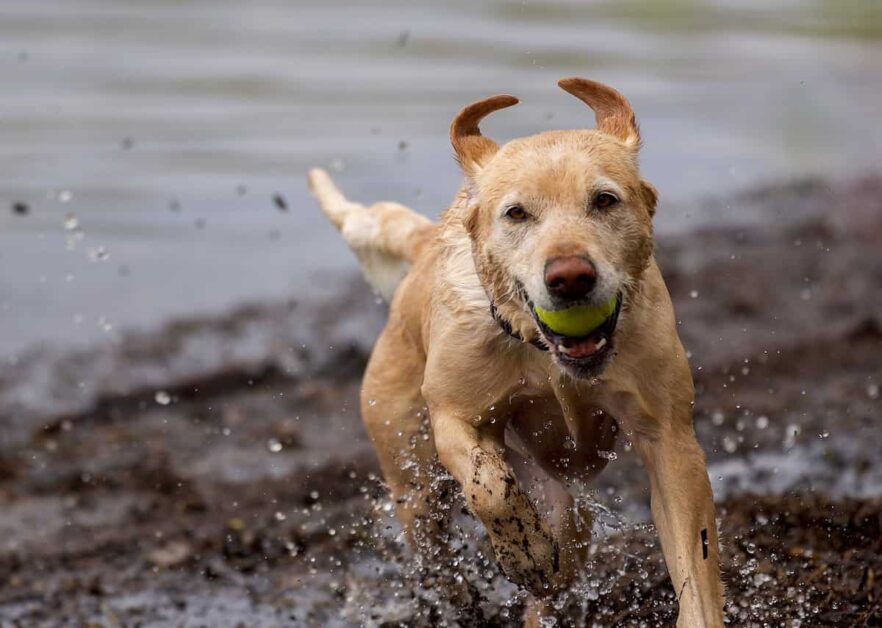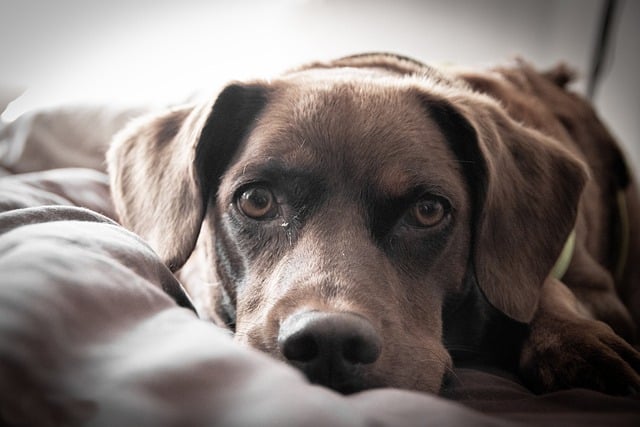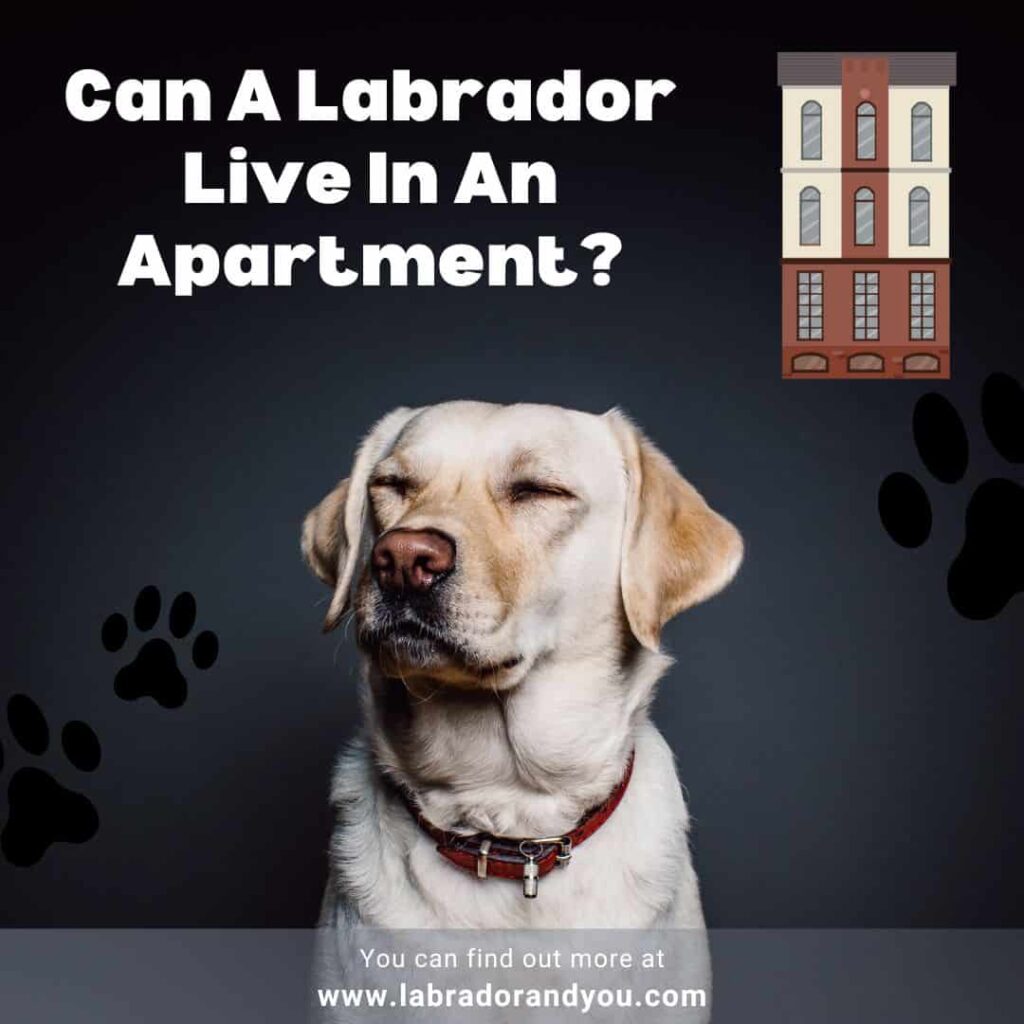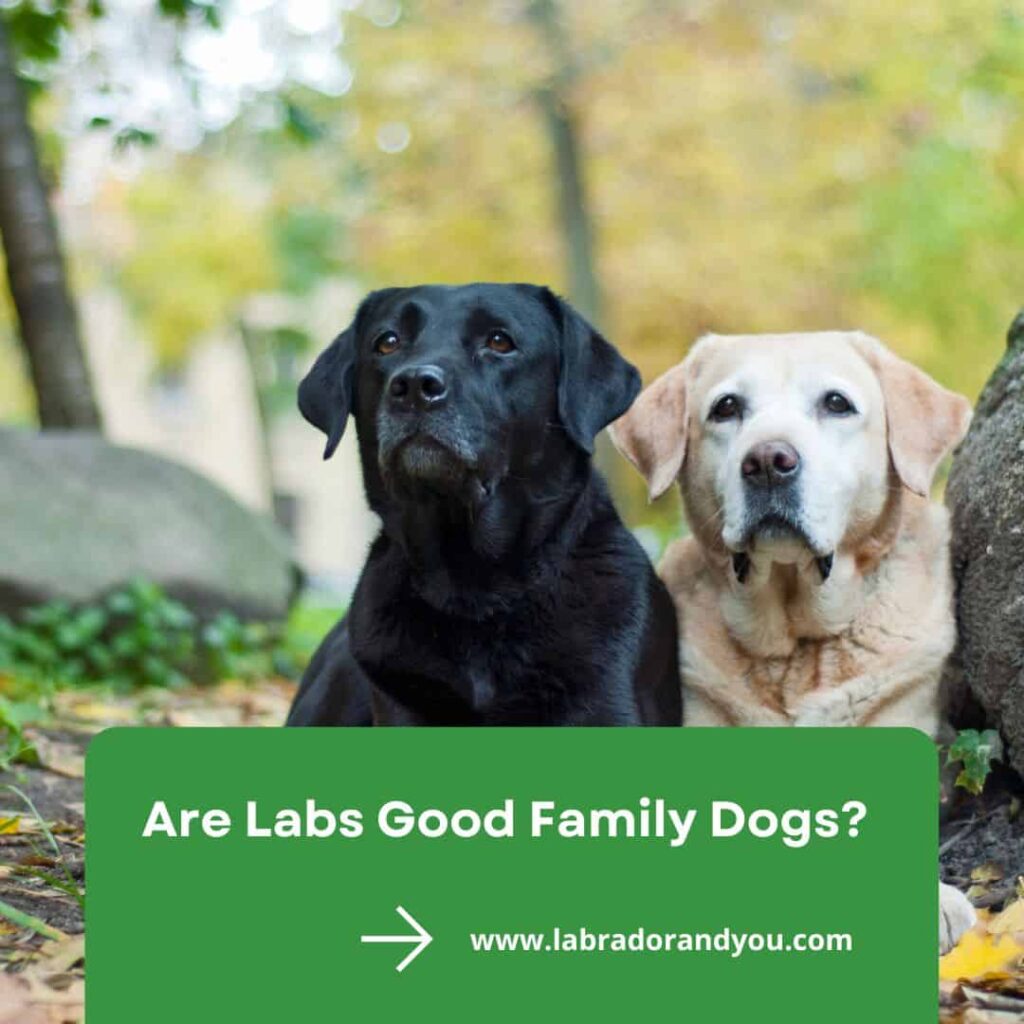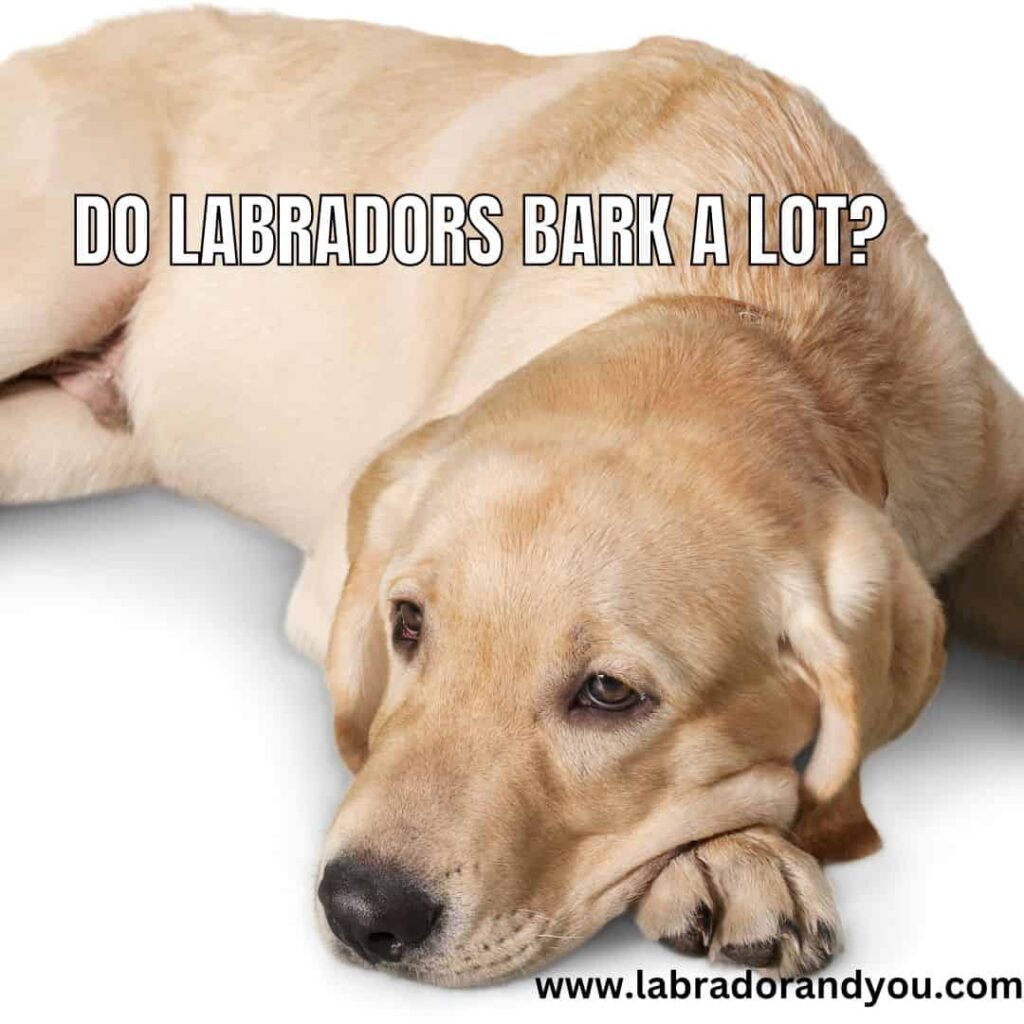When dogs exhibit unusual behavior like pacing, whining, trembling, or hiding, it typically signals they are anxious, stressed, or uncomfortable. So wondering, “why is my dog acting weird?” Common triggers include loud noises like fireworks or thunder, being home alone, construction sounds, or seeing strangers. Illness, injury, or aging can also prompt odd behavior and incomplete training.
Dogs acting weird may just need more exercise and mental stimulation, too. If your dog suddenly acts out of character, evaluate their environment for stressors. Rule out health issues. Be patient, keep routines consistent, and try calming aids like pheromones. If behavior persists, consult an animal behaviorist or vet.
22 Typical Ways Your Dog Can Act Weird
Hiding
One of the ways dogs might behave weirdly is by hiding. It’s common for a pup to find a safe spot under furniture or in secluded areas of your home. They do it when they’re scared, anxious, or uncomfortable.
Aside from external factors like noise and environmental changes, internal issues like pain or illness could also prompt your dog to hide. It isn’t easy to pinpoint these underlying health concerns as dogs are experts at masking their discomfort.
- Has your canine companion suddenly taken residence behind the couch for an extended period without apparent cause?
- Keep a close eye on their behavior and check for other signs of distress like lethargy or loss of appetite.
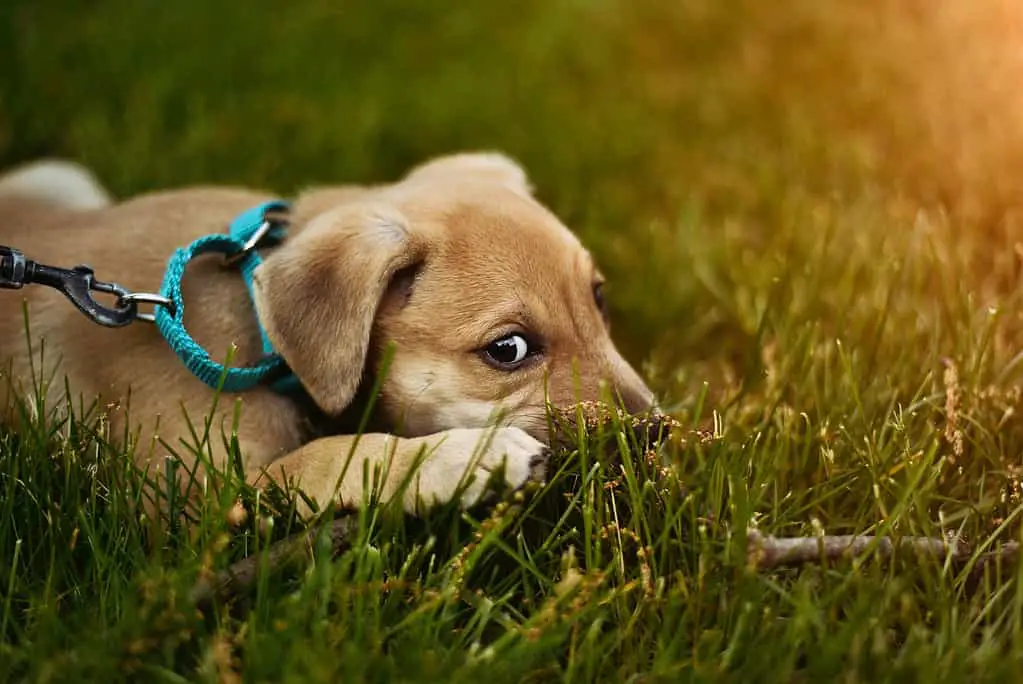
Eating Poop
Another baffling, weird behavior that some dogs exhibit is eating poop or coprophagia. Before you become too alarmed, know this behavior isn’t uncommon among dogs.
Puppies may eat their feces out of curiosity. They haven’t yet learned how to differentiate tasty treats from waste. A major change in diet can also prompt them to develop odd eating habits like snacking on excrement.
A dog indulging in coprophagia could also signify an underlying health issue. Malnourishment or poor digestion can cause your dog to crave nutrients it’s not getting enough of. It leads them to consume feces for sustenance.
Yelping Or Screaming
You may notice your usually quiet and well-behaved dog suddenly starts yelping or screaming. It’s natural to feel alarmed by this odd behavior. It can indicate that your dog is in pain due to an underlying medical condition or injury.
Dogs might also exhibit excessive vocalization when dealing with stress, anxiety, or fear brought about by environmental changes.
Moving to a new house, having a new baby join the family, and loud noises like fireworks are a few. Even encountering other pets in the neighborhood could trigger these responses.

Whining Or Crying
Dogs often whine or cry when they are in pain or discomfort. However, other reasons for excessive whining and crying can include separation anxiety, boredom, or lack of attention. Ensure your dog receives adequate exercise and mental activities to alleviate these behaviors.
Excessive Barking
Dogs bark to get attention or communicate with their owners. Excessive barking can be a sign that something is wrong. If your dog incessantly barks, it could indicate anxiety, boredom, or frustration.
Dogs may bark excessively due to discomfort caused by illnesses like Cushing’s disease. No matter the reason behind your dog’s barking habit, addressing this behavior is important.
It can lead to bigger problems like neighborhood complaints or aggression towards other pets or humans.
Sniffing The Butts Of Other Dogs
Dogs have a peculiar habit of sniffing the butts of other dogs. It can seem strange to many dog owners. However, this behavior is normal and serves as a way for dogs to learn about each other.
When dogs smell each other’s rear ends, they gather information such as age, gender, reproductive status, and health. The glands in their rectums contain pheromones that help with communication between dogs.
Shivering, Shaking, Or Trembling
I’ve noticed that my dog sometimes shivers, shakes, or trembles. At first, I thought it might be just because he was cold or scared.
The reason is fear or anxiety. It may shake uncontrollably if a dog feels threatened or exposed to something unfamiliar. Other possible explanations include illness and injury, aching due to arthritis, low blood sugar levels, and insecticide exposure.
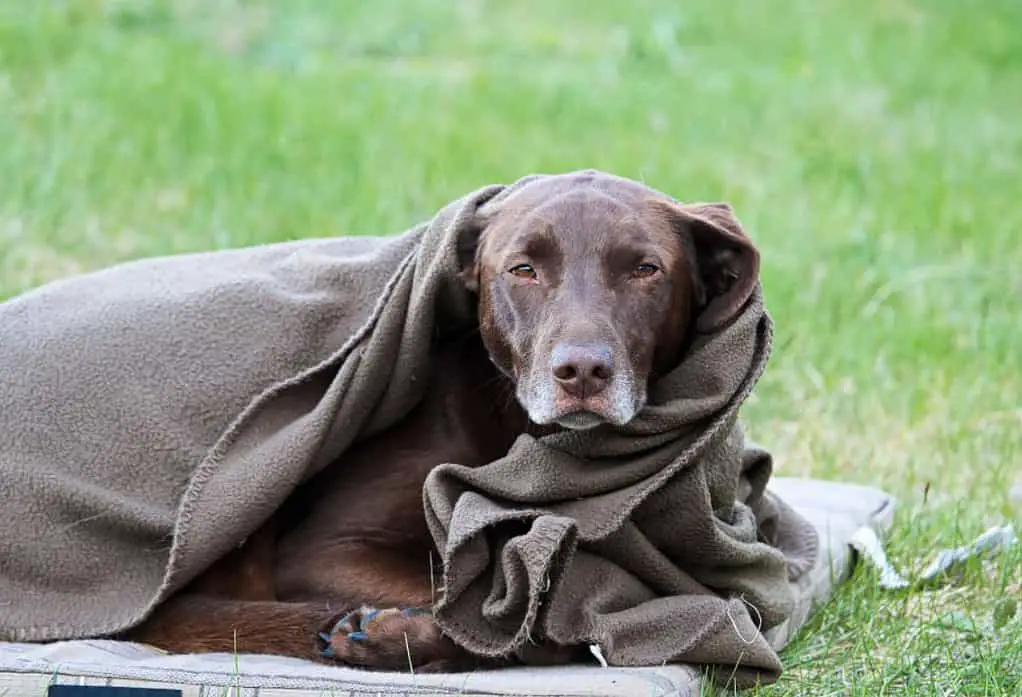
Shying Away From Contact
When my dog started shying away from contact, I was concerned. This behavior is often a sign of stress or anxiety but can also indicate illness.
If you notice your dog shying away from contact, observe other weird behaviors. Consult with a veterinarian if the behavior persists or becomes more frequent. Consider whether any recent changes in your dog’s routine are causing undue stress.
Licking Their Paws
Another way a dog acts weird is by excessive paw licking. Dogs lick their paws due to allergies, aching in the paw area, boredom, and anxiety.
Observe your dog’s behavior closely if you notice them constantly licking or chewing their paws. Talk to your veterinarian to rule out underlying conditions like yeast infections or skin allergies.
Chasing Of Tails
Some dogs have a habit of chasing their tails, which can seem strange and inexplicable. This behavior is often seen as just playful or funny antics.
But it can also be caused by boredom or anxiety. Monitor your dog’s tail-chasing habits and talk to your veterinarian if you notice hair loss or skin irritation.
Humping
Another embarrassing weird behavior your dog may exhibit is humping. Watching your pup mount a pillow, toy, or even another pet can be difficult.
While it’s often associated with sexual behavior, dogs can hump for various reasons. It can be because of excess energy or excitement. It may also signal medical conditions like skin irritation or allergies that cause discomfort.
Rubbing Their Butt On The Floor
One of the weirdest behaviors is a dog rubbing its butt on the floor. This can be alarming, but it’s usually nothing a dog owner should worry about. Dog scooting can be due to irritation or itching caused by worms and fleas.
An uncomfortable bowel movement due to constipation or diarrhea can also cause dog scoot. Some dogs rub their butts on the carpet to express excitement or happiness. Others may do so as part of their usual grooming routine.

Aggression
Aggression in dogs is a serious issue and is reflected in growling, snarling, biting, and attacking. Address aggression as soon as possible before it causes harm to other pets or people.
Fear or discomfort with their environment or certain situations can cause aggression. Some dogs become aggressive when threatened by unfamiliar people or animals.
Another cause of aggression is territorial behavior. Some dogs are very protective of their family members and living space.
They display aggression towards anyone who comes too close to either one. If a person brings their head toward a dog’s head, it is taken as aggression.
However, it can be managed through appropriate dog training methods. Set boundaries for the pet with consistent reinforcement and follow the rules properly.
Lack Of Energy And Activity
A dog can act weird by displaying an unusual lack of energy and activity. If your dog suddenly stops running, jumping, or playing like it used to, it could indicate an underlying issue.
Dogs suffering from osteoarthritis or hip dysplasia may experience aching and discomfort when moving around. They tend to become more sedentary than usual. Additionally, diet or routine changes can lead to lethargy in dogs.
Some breeds have naturally low energy levels compared to others. Hence there isn’t necessarily cause for alarm if your pooch is chilled out most of the time.
They Stop Eating
When our dog refuses to eat suddenly, it can be concerning. It’s common for dogs to go through periods of loss of appetite due to minor digestive issues or stress. Kidney disease and bladder stones could lead to decreased appetite and eating discomfort. If the behavior persists beyond 24 hours, a vet visit is necessary.
They Stop Drinking Water
It can be scary when your pup suddenly stops drinking water. Dehydration can lead to serious health concerns like kidney failure and brain damage. Dogs need one ounce of water for every pound of body weight daily.
One common reason why dogs stop consuming water is due to bladder stones or urinary tract infections. Environmental factors like lack of clean water or routine changes can cause dogs to stop drinking.
They Start Drinking Water Excessively
Your pooch may suddenly drink more water than usual. It’s common for dogs to drink more when they are hot, after exercising, or if they have eaten dry food.
When my pup started drinking more water, I immediately visited the vet for a check-up. The veterinarian informed me that excessive thirst indicates health problems. He had developed an infection, causing his body to lose fluids faster than normal.
Acting Overly Affectionate
Seeing our dogs showing affection is always a joy. It can be worrying if they start acting overly affectionate. It could signify separation anxiety if your dog constantly follows you and won’t leave your side.
Dogs with this condition become extremely anxious when left alone. They may engage in destructive chewing or other undesirable behavior. Excessive affection can also indicate that something is wrong physically. Some dogs become clingy when sick or suffering because they seek comfort from their owners.
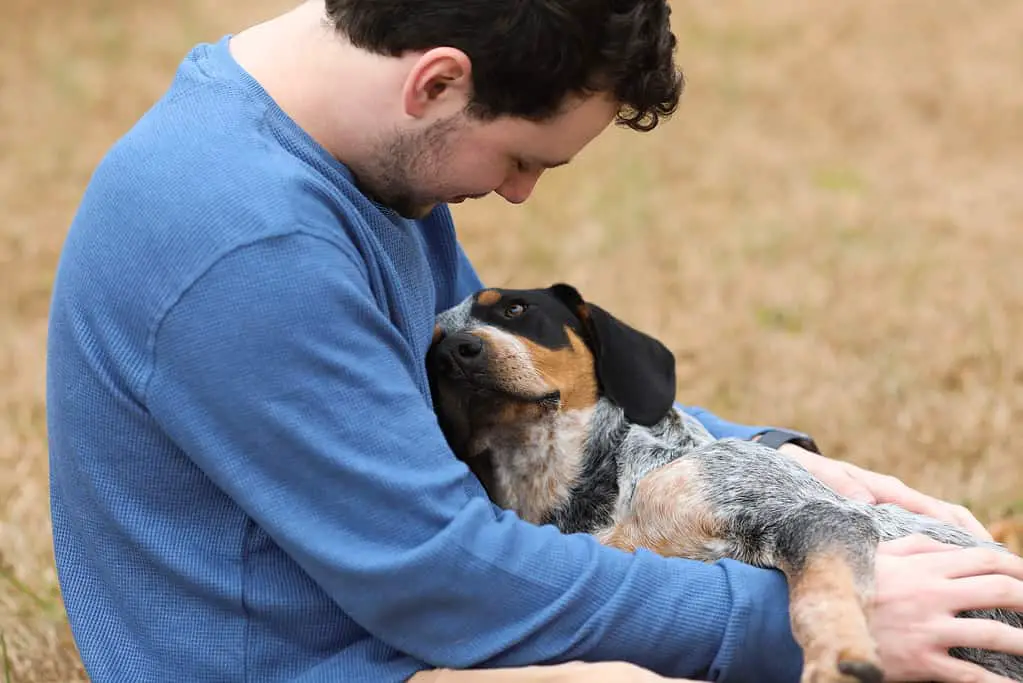
Hacking And Coughing Continuously
Is your pup constantly hacking or coughing? Some possible reasons include respiratory infections, allergies, heartworm disease, or even kennel cough. Environmental factors, like air pollution or second-hand smoke, can contribute to chronic coughing in dogs.
Excessive Chewing
One weird behavior that dogs may exhibit is excessive chewing. While it’s normal for dogs to chew on bones or toys, excessive chewing indicates anxiety or boredom. Some may even reflect aggressive chewing, destroying furniture or other household items.
- Focus on identifying the root cause of this behavior.
- Provide your pet with adequate mental exercise through playtime and training sessions.
- Offer chew toys and bones meant for dogs’ teeth cleaning needs.
- Hard objects may choke on if swallowed, resulting in vomiting, obstruction, and GI bleeding.
Running From Particular Objects
My puppy has suddenly started running away from the vacuum cleaner or broom. This odd behavior may be a sign of fear and anxiety. Dogs have sensitive hearing and can be easily startled by loud noises or sudden movements.
They Suddenly have Accidents In The Home
One possibility is that there has been a sudden change in their routine or environment. If you have recently moved to a new house or have new people, it can cause more indoor accidents.
Another explanation could be a urinary tract infection or kidney disease. Ensure your pet has plenty of opportunities for outdoor breaks and access to the water bowl.
More Reasons Why Your Dog Acts Weird
Illness And Injury
An infection or parasite infestation can cause vomiting, diarrhea, sudden lethargy, and other strange behaviors in dogs. Injuries like a broken bone or sprain can lead to limping or difficulty standing up. Health conditions like arthritis or allergies may also contribute to odd dog behavior.
Stress And Anxiety
Our furry friends like us can experience stress and anxiety. Loud noises, changes in routine, or being separated from their owners can cause most dogs to act weirdly.
A few coping mechanisms are plenty of mental stimulation through puzzle toys or obedience training. A predictable routine for feeding and exercise can help reduce stress levels.
Dietary Changes
One very common reason for a dog acting weird is due to a dietary change. This could include switching to a new brand or food type. Suddenly, removing certain foods from their diet or introducing new treats can also impact them.
My labrador Sinu, started acting strange after I switched his food brand without gradually transitioning. He refused to consume for several days and began acting lethargic and disinterested in his usual routines.
Fear And Trauma
Something as simple as a loud noise or an unfamiliar person can trigger a dog’s weird behavior. They may shake, whine, or growl. My friend’s dog was hit by a car at a young age and now gets anxious whenever he hears the sound of cars passing by. The trauma from the accident has affected the dog’s behavior. It makes it hard for him to relax when cars are nearby.
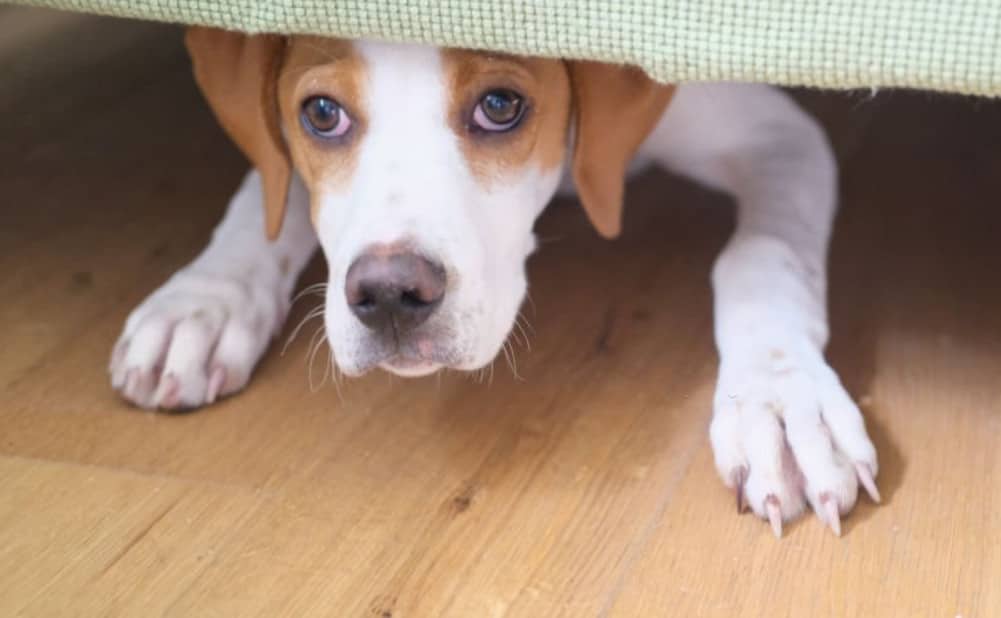
Inadequate Nutrition
Your dog’s food must be nutritious and given in a set routine. Inadequate nutrition can significantly impact your dog’s behavior and overall health. Monitoring their eating habits and discussing any concerns with your vet is essential.
Hormones
As dogs sexually mature, hormones can affect their behavior. Male dogs may become territorial or aggressive towards other males. Female dogs may exhibit signs of estrus, such as increased vocalization or restlessness.
Medical conditions like hyperthyroidism can also affect hormone levels. It can lead to odd behaviors in both male and female dogs.
Cognitive Dysfunction
As dogs age, they may experience cognitive dysfunction. It affects their brain functions and causes confusion, disorientation, aggression, and other weird behaviors. The symptoms of cognitive dysfunction can vary from dog to dog.
They are typically seen in senior dogs over the age of 8. Cognitive dysfunction is not curable. However, a dog’s life can be managed through medication and environmental changes.
Allergies
A dog acting weird is often caused due to allergies. It can lead to itching, ear infections, and gastrointestinal issues. If your furry friend has skin allergies, you may observe excessive scratching or chewing on certain areas.
Food allergies can cause digestive problems like vomiting and diarrhea. Environmental causes like pollen, dust mites, or eating grass often cause dogs’ allergies. They can also be due to certain ingredients in their food or treats.
Fear Of Fireworks
Many dogs find the loud noises and bright lights of fireworks incredibly frightening. It often leads to shaking, hiding, or destructive behavior like chewing or digging.
This fear can also cause dogs to become hyper-vigilant and constantly alert for potential threats. Take preventative measures like creating a safe space in your home where they can retreat during firework displays.
Storm Phobias
You may have noticed your dog’s weird behavior during thunderstorms. This could be due to storm phobias. It is an intense fear of loud noises and weather conditions like lightning strikes and heavy rain.
Storm phobias can also lead to destructive behavior in dogs. They may chew on furniture or destroy other household items when frightened. Provide them with a safe space during storms where they can seek refuge during storms.
What To Do When You See Your Dog’s Strange Behavior?
Try To Identify The Reason
When your dog starts acting weird, identify what causes the strange behavior. Monitor your pet closely, taking note of any changes in their routine or habits.
Seek Professional Help If Necessary
Seek professional advice if your dog is acting weird and you can’t identify the reason. A vet or a certified dog behaviorist can determine underlying medical conditions or behavioral changes.
For example, excessive barking and destructive chewing could be signs of separation anxiety. It requires a specialized training plan for effective management.
Attempt To Remove Or Mitigate The Cause Of The Weird Behavior
Once you’ve identified the reason, attempt to remove or mitigate it as best as possible.
- Is your pet excessively barking due to separation anxiety when you leave for work?
- Leave a sweater with your scent or play calming music to ease their anxiety.
Remember that some causes may require professional assistance. Is your dog is acting unusually aggressive towards humans or other animals? Time for Professional guidance.
Some Critical Reasons Your Dog May Be Shaking
Here are a few reasons why your dog is shaking.
Heat Exhaustion And Distemper
Heat exhaustion happens when your pet spends too much time outside in high temperatures without enough water and shade.
- Symptoms include excessive panting, excessive drooling, lethargy, and vomiting.
- Distemper is a viral disease affecting a dog’s respiratory, nervous, and gastrointestinal tract.
- It can cause symptoms like coughing, sneezing, diarrhea, fever, seizures, and paralysis.
Your Dog Has Been Poisoned
If your dog is acting strangely, they may have been poisoned. Dogs are naturally curious creatures. They can easily ingest toxic substances like medications, chemicals, or poisonous plants.
- Act quickly if you suspect your dog has been poisoned.
- Contact a vet immediately for guidance on what to do next.
- Inducing vomiting may be necessary to remove the substance from your dog’s stomach before it can cause further harm.
Your Dog Has Generalized Tremor Syndrome (GTS)
If your pet is experiencing uncontrollable shaking or tremors, it may suffer from Generalized Tremor Syndrome (GTS). GTS is a neurological disorder that causes rhythmic shaking or twitching of the body. It can occur while the dog is awake or asleep.
It’s more common in younger dogs and may occur due to stress, excitement, anxiety, or overstimulation. While GTS isn’t life-threatening and doesn’t cause aching, it can be uncomfortable. Benzodiazepines may be prescribed to manage symptoms in some cases.
Seizures And Bloat
I’ve seen cases where dogs suddenly start shaking uncontrollably. It’s often a sign of seizures. Head trauma, brain tumors, or liver disease can cause seizures.
Another issue that can cause strange behavior in dogs is bloat. This is when the stomach fills with gas and twists on itself, cutting off blood flow to vital organs. It’s most common in large breed dogs and can be life-threatening if not treated quickly.
Symptoms may include restlessness, drooling excessively, retching without vomiting, and a distended belly.
Your Dog Has Cushing’s Or Addison’s Disease
If your dog shows signs of extreme lethargy, weight loss, and vomiting, they may have Cushing’s or Addison’s disease. Both conditions can cause the dog’s strange behavior due to hormonal changes.
Dogs with Cushing’s or Addison’s often exhibit excessive thirst and urination. Panting and appearing bloated are also visible symptoms. A series of tests are necessary to confirm a diagnosis and determine the best treatment.
FAQs
Why is my dog acting weird all of a sudden?
There could be various reasons for your dog’s sudden behavioral change, like illness, aching, stress, or physical harm.
Why is my dog not acting like himself?
Dogs may exhibit changes in behavior due to health problems, discomfort, stress, or emotional changes. Talk to a vet.
Why is my dog acting strange and hiding?
Dogs may act strange and hide when scared or anxious. They might be seeking a quiet and secure space. Creating a calm and safe environment for your dog can help alleviate this behavior.
How do you know if your dog is depressed?
Signs of dog depression include changes in appetite, sleep patterns, energy levels, withdrawal from activities, etc. A vet can help diagnose depression and determine appropriate treatment.
Why is my dog acting sad?
Dogs can be sad due to the loss of a companion, changes in routine, illness, or emotional distress.
How do you cheer up a dog?
You can cheer up a dog by engaging in activities they enjoy. Playing games, walks, mental stimulation, proper exercise, and social interaction might be beneficial.
How do I know if my dog is in pain?
Signs of pain in dogs can include changes in appetite, behavior, posture, vocalization, mobility, and sensitivity to touch. If you suspect your dog is suffering, consult a veterinarian for proper assessment and management.
How do you fix a depressed dog?
Treating a depressed dog involves a combination of medical evaluation, behavior modification, environmental enrichment, and medication. A vet and a professional dog behaviorist can help create a tailored treatment plan.
How can I tell if my dog is lonely?
Signs of loneliness in dogs include excessive vocalization, destructive behavior, loss of appetite, etc. Providing companionship, structured activities, and considering another compatible pet can help alleviate loneliness.
How do you make a sad dog happy again?
Making a sad dog happy again involves addressing the underlying cause of sadness. The cause can be physical, emotional, or environmental. Veterinary care, mental and physical stimulation, consistent routine, affection, and reassurance can be incorporated.
Author Profile

- Product Reviews Specialist and Cofounder
-
Labradors have an extraordinary capacity for love and companionship, and my mission is to help you unlock their full potential. Hi there! I'm Sarah, a proud contributor to Labradorandyou, the go-to online resource for all Labrador Retriever enthusiasts. As a lifelong owner and avid admirer of these remarkable dogs, I bring a wealth of knowledge and hands-on experience to our readers.
One of my strongest beliefs is in the power of positive reinforcement training. I'm truly passionate about helping our readers build strong, positive relationships with their Labradors. Whether you're a first-time owner or a seasoned Labrador enthusiast, I aim to provide you with the resources and guidance to cultivate a bond that will endure a lifetime.
Also by the author
 FAQNovember 17, 2023Why Is My Dogs Poop Yellow? 8 Reasons & Solutions
FAQNovember 17, 2023Why Is My Dogs Poop Yellow? 8 Reasons & Solutions ReviewsNovember 17, 2023Hill’s Science Diet Review [ Detailed ]
ReviewsNovember 17, 2023Hill’s Science Diet Review [ Detailed ] PuppyNovember 16, 2023How To Bottle Feed A Puppy? Facts You Can’t-Miss
PuppyNovember 16, 2023How To Bottle Feed A Puppy? Facts You Can’t-Miss FAQNovember 16, 2023Why Do Dogs Dig On Carpet? Complete Guide
FAQNovember 16, 2023Why Do Dogs Dig On Carpet? Complete Guide
